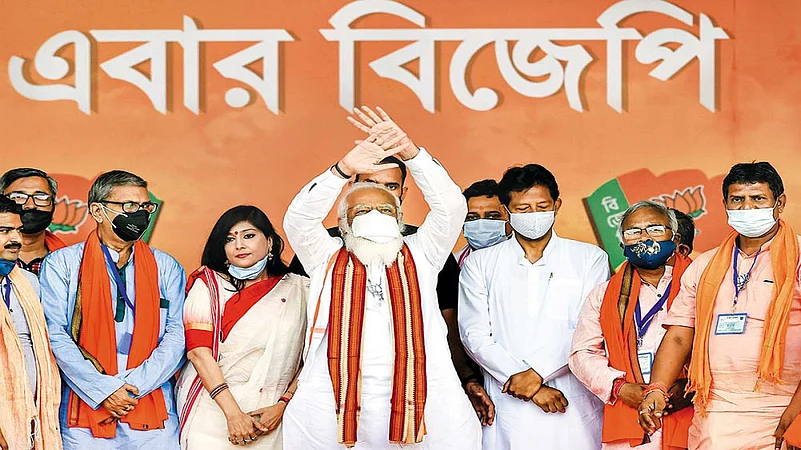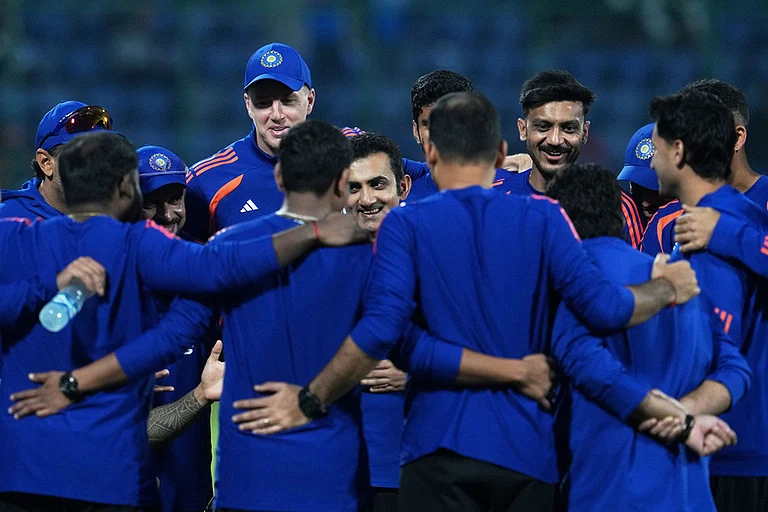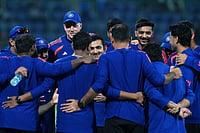On April 17, during an election rally in Bengal’s Asansol, Prime Minister Narendra Modi lauded the huge crowd that had gathered to hear him speak. He didn’t hide his delight. “I have seen such a (large) gathering for the first time. Wherever I look, I can only see people. You have done wonders,” he said during his speech. This was on a day when India saw more than 2.61 lakh fresh Coronavirus cases across the country and over 1,000 lives lost. It was the fourth consecutive day that had seen over two lakh cases as the second wave of the pandemic raged through India. “This is also the first time when such huge crowds of sick people and a record number of deaths have been seen,” Congress leader Rahul Gandhi responded to the PM through a scathing tweet.
Ironically, the same morning, Modi had spoken to a top seer, Hindu Dharma Acharya Sabha president Swami Avdheshanand Giri Ji Maharaj, appealing that the participation in the Kumbh mela—which had attracted lakhs of devotees—should be kept symbolic in view of the raging pandemic. This was 17 days after the Kumbh mela had started and many seers, doctors, policemen and administrative staff were infected by the coronavirus.
By that time, dystopian scenes were playing out across the country—patients gasping for breath due to an acute oxygen shortage; dying on the roads after not getting a bed in a medical facility or vital life-saving drugs; and cremation grounds running out of space for the last rites with any semblance of dignity. Played on loop on national TV and social media, the gut-wrenching scenes from across the country, including the national capital, evoked anger among the people who are asking questions about the lack of preparedness despite enough warnings that a second wave was coming.
The states are pleading for supplies of oxygen and medicines like Remdesivir and Fabiflu. Hospital authorities are approaching courts as they run out of oxygen. The Delhi High Court directed the Centre “to beg, borrow or steal” but provide oxygen to the medical facilities. “We are shocked and dismayed…Why is the government not waking up to the reality?” asked the court. The Madras High Court, on April 26, said the Election Commission of India (ECI) was singularly responsible for spreading coronavirus and said that it should probably be booked for murder for its “irresponsible” behaviour. It pulled up the constitutional body for failing to take measures against political parties that held rallies in violation of all Covid protocols.
While all parties held election rallies, it was the prime minister’s continued active involvement that was questioned the most, with the country battling the virulent second wave. Sources in the government say that Maharashtra Chief Minister Uddhav Thackeray was unable to speak to Modi—to discuss the supply of oxygen—because the PM was in West Bengal on April 17.
The BJP’s seemingly single-minded pursuit of electoral victory has not gone down well. Congress leader Manish Tewari says that the government took its eyes off the ball. “The imagery of the past fortnight could not have been more bizarre. On one hand, the prime minister and home minister were addressing frenzied supporters in West Bengal and, on the other, sick and even dying people were being turned back from hospitals for lack of space. The government’s negligence is nothing short of criminal,” he says.
However, Tewari is not sure if the Modi government will pay the price for the “abject malgovernance” that has seen a deficit of Rs 32 lakh crore over the two fiscals of 2020-21 and 2021-22. One can never know what becomes an election issue. “Hundreds of children died of encephalitis in eastern Uttar Pradesh but it never became an electoral issue,” he rues. “Forget electoral considerations, is this the government that a country deserves?” questions Tewari. He believes that if the tragic pain brought on by the ravaging virus turns into sustained anger, then perhaps the change will come. “After the initial yelp of pain is numbness but when it coalesces into anger, then it makes a difference,” he tells Outlook.
There is growing unease even within the BJP. Several senior leaders think that in the battle for Bengal, the party lost sight of the things that matter. “Ever since the cases started plateauing and then going down in October-November last year, Covid hardly ever came up for discussion in party meetings. It was as if it was gone for good. The entire focus was on the assembly elections in the four states, especially West Bengal,” reveals a senior party leader.
Even the RSS, the fountainhead of BJP, has sensed the anger on the ground. Sarkaryavah Dattatreya Hosabale issued a statement recently, saying the pandemic has posed a formidable challenge to the country and that “destructive and anti-Bharat forces can take advantage of the adverse circumstances to create an atmosphere of negativity and mistrust in the country.” Sources say that the RSS leadership has conveyed to the party that the narrative on the ground is changing. “The BJP needs more than a Pulwama attack that it used in the run-up to 2019 elections to rake up nationalism and patriotic sentiment for political gains,” an RSS functionary claims.
Former editor of Organiser Seshadri Chari concedes that there is some anger among people about the handling of the pandemic by the government but he doesn’t see a huge anti-government wave building up. “The government is on a strong footing. If the states try and play politics it will backfire on them. They cannot be seen as politicising the pandemic. Also, people’s anger is more directed towards the respective governments of their states. The blame doesn’t come to Prime Minister Modi,” he explains.
However, he admits that the PM’s huge rallies were avoidable. “It is a do-or-die situation for the party in West Bengal, and they can sense that they have a real chance of forming the government there. But they scaled it down after the criticism without much damage,” Chari tells Outlook.
According to him, the attacks against Modi and the government on social media and elsewhere have been “disorganised lone-wolf attacks”. He says it is nothing that the IT cell of the BJP cannot handle. “Once the second wave of Covid subsides, people will forget and Modi’s popularity will be intact,” he adds.
Political analyst Sajjan Kumar Singh agrees that the handling of Covid by the government is not going to make any dent on Modi politically or electorally, and says that it is borne out by what he is seeing on the ground. Travelling across West Bengal, he says, he has not come across even a single voter who has changed his mind about voting for Modi after the second wave of Covid. Incidentally, Singh has already come out with an extensive report on the state, saying that BJP will win over 160 seats.
“Yes, Modi’s brand and charisma have taken a dip but not substantially. He is going to come out of it without significant political cost,” he says. According to him, the response of the people is mostly determined a priori. “Political psychology does not draw inference from rationale. It is defined by existing likes, dislikes, biases, prejudices and perception. So if you like Modi, you will be willing to defend him in everything, and vice versa,” he explains.
“So it may be a matter of great outrage the way his government handled the corona crisis and how it let it aggravate in its desire and drive to win Bengal elections but those who identify with him as their leader, they will mount an offensive defence,” Singh says. There is anger against Modi, and he has lost support among the urban millennials but the majority are still with him, he adds.
Also, the crises have largely seen Modi coming out stronger. “Whether it was demonetisation, the economic slowdown, the CAA protests or the migrant crisis; at the end of each crisis there is a call for a strong, bold leader. And the majority embrace the view—who else but Modi. The crisis needs anger that the prime Opposition party can channel into political opportunity. It is as much the crisis of opposition that is sustaining the charisma of Brand Modi,” Singh avers.


























